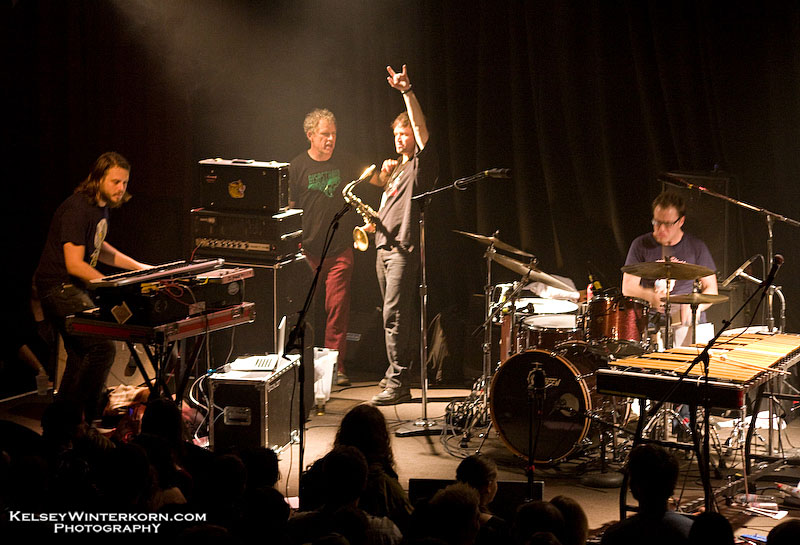
Photos by Kelsey Winterkorn
Garage A Trois is exactly what any good super-group strives to be: capable, clever, copacetic and always uncontrived. When you take the raw and weathered talent of New Orleans drummer Stanton Moore, add the percussive and high energy vibraphone genius that is Mike Dillon you are sure to lay a foundation for any good improvisational jazz band to build upon. Then putting a performer like Skerik on the saxophone (while also serving as the resident crowd communicator) you have a recipe for some of the most free-flowing acid-jazz in the business.
When Garage A Trois founding member and 8-string guitar virtuoso Charlie Hunter left the band in 2008, it was interesting to see if the group would continue making music for the masses. They did and they are. In his stead they have added the Hammond-pounding Wurlitzer-tickling Marco Benevento. Originally renamed Garage A Benevento, the band reverted back to its original name, or GAT, and is touring on the release of their first album in four years, Power Patriot. Seeing a group made up of such raw and individual talent is a treat, a rare treat as their shows are few and far between. The question begging to be answered was can these four genre-bending multi-talented musicians create palatable music together in a live setting, and the answer was clear thirty seconds into the first song they played: a resounding, “Hell yes!”
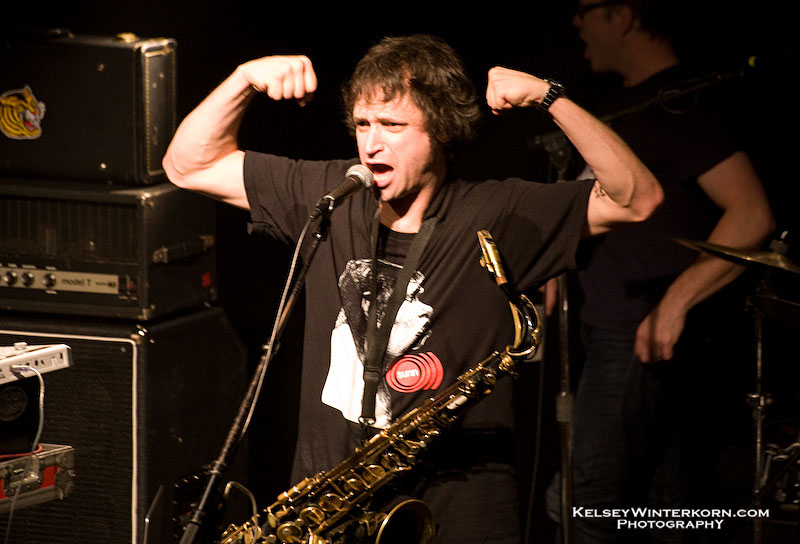
The song they chose to open with was “Electric Doorbell Machine” from their new album. A diverse construct showcasing all the talents of the group (albeit briefly), it had its moments of chaotic noise. Then Moore would play a slow and clean drum beat before Benevento and Dillon entered in sync on organ and vibraphones, playing layered chords, with Skerik right with them on saxophone. It was like jumping right into the deep end of a cold pool, it knocked the wind out of you, but acclimated you to the next three hours in a matter of minutes. The set list from that point turned out to be the last thing on anyone’s mind, including the band. They are jazz-improv at its purest. They go into each nights show without a game plan or song list; tonight they came out on stage- cracked crazy grins at each other and the crowd and began to play.
Stanton Moore proved to be more energetic and instrumental on the drums than all the drummers I’ve seen in the last month combined. His raw approach grabs hold of you as the rest of band fills in the gaps in righteous order. Moore cuts up the drumming, playing half beats, mastering the off timing and all the while keeps the momentum moving forward. He is supplemented and matched in energy by Mike Dillon on vibes. At times playing with three mallets in each hand, layering some of the most unique sounds on top of Moore’s drumming, Dillon’s range didn’t end there as he would randomly reach over his vibraphones and pound on the rim of Moore’s crash cymbal. Dillon also made liberal use of the sustain pedal on his vibes, his foot moving in and off beat, sometimes nearly as fast as his hands. If a mallet were to slip away from his overflowing grip he would just grab another from the reserve baskets on each end of the instrument. He also played the bongos on multiple occasions, at one point picking up a small cylindrical drum and screeching out a unique and almost horrid noise, only in the way that he did it, in concert with Skerik on sax, it worked. At other times, when Moore would slow the beat or quiet it to a low hi-hat cymbal-laced tinge, Skerik and Moore would go back and forth, sax to vibe and vibe to sax, with Benevento laying eerie and moving melodies on the keys.
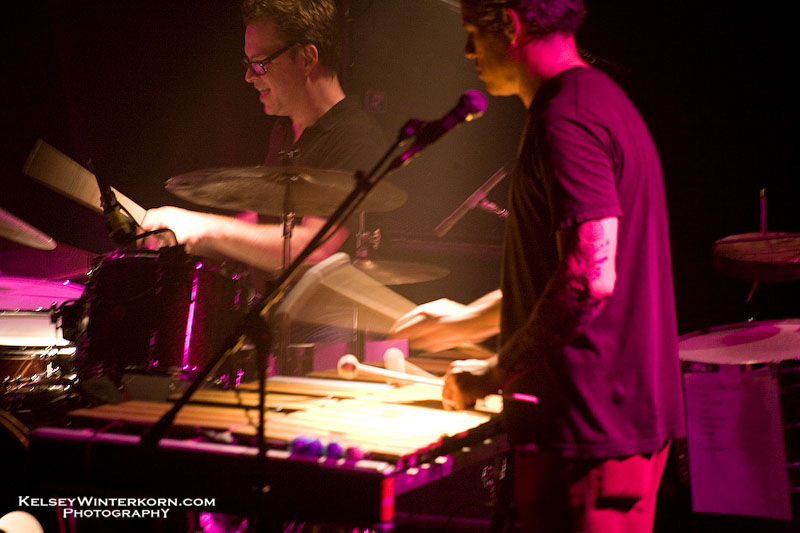
There were times, however rare, when the music became a cringe inducing mess of contorted noise. It seemed like the amount of energy brought by the quartet would step over itself and lose any semblance of anything musically recognizable. Thankfully in such instances, Moore gently pulled the tangled mess of over-played improv back into a rhythmical direction. From there, they could branch out again.
Marco Benevento, the most recent addition to GAT, but not at all the least talented, added an element that the previous Garage A Trois was missing. He not only had his organ and electric piano but also a synthesized bass machine that he used on multiple occasions. Something about having a consistent bass beat to complement the overplay of sax, vibes and drumming kept the show moving in the one direction and the songs vibrantly danceable. Benevento also added some of the best solos of the night, as his fingers moved from one end of the keyboard to the other. On other occasions he layered haunting slow background chords. In addition, Benevento is a seasoned composer and a some of his songs have been picked up by GAT, such as the light and melodic “The Real Morning Party” with hints of Chuck Berry’s “Rock and Roll Music.” On this one Skerik played low on the sax and filled the gaps of Benevento’s heavily synthesized melody making it a Garage A Trois jazz compilation.
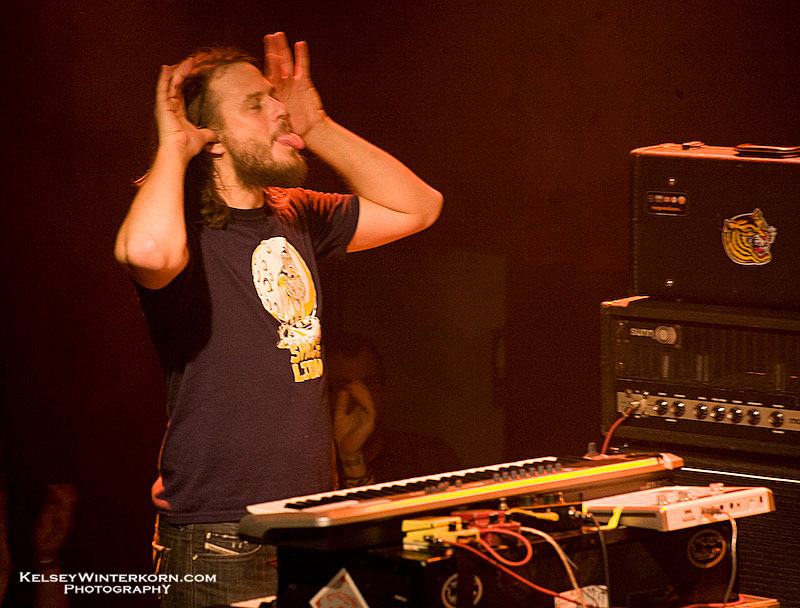
Skerik, meanwhile, filled the gaps, and swung himself violently from one side of the small and crowded stage to the other. Sometimes a bit over the top, Skerik’s “wild man” antics were truly entertaining and just short of being overkill and played out.
As the show progressed, songs mashed into each other. There were no segues, just jazz, and musically electrifying jazz at that. One could call it acid-jazz-prog-funk, but that would sell short GAT’s ability to play punk rock, or blues, also it would bypass the fact that they covered multiple songs, including two Led Zeppelin tunes: “No Quarter” and “Immigrant Song.” The latter saw Dillon now shirtless switching out with Moore and playing the drum kit while Stanton with his back to the crowd and drumstick in hand, climbed atop his bass drum and chimed in with his two cents: a spectacle that one had to see to believe.
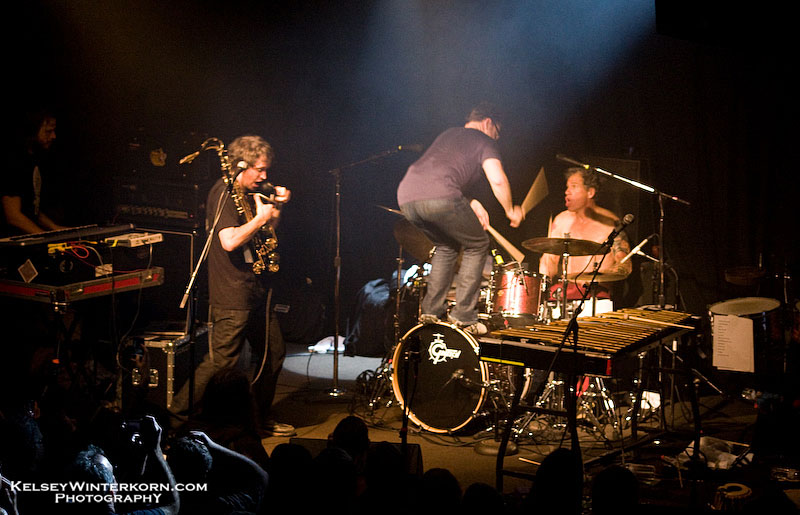
The camaraderie that is shared between these four savants is thick and tangible. From the constant praise that Skerik would give his fellow musicians, to the way Dillon and Benevento would make faces at each other across the stage, you could tell that this is a close group. Charlie Hunter, with his 8-string added so much to GAT, but this is a totally new band, offering the same wild abandon of before with a more synthesized and loose sound built perfectly for the live show.
Could it have been better? Not this night. This is improvisational music, and so perfection is found in the imperfections and as long as the band communicates through their instruments, pulls through the chaos and plays those instruments like no one else then we all can leave satisfied. In San Francisco, Saturday night Garage A Trois made sure that was case.


No Comments comments associated with this post